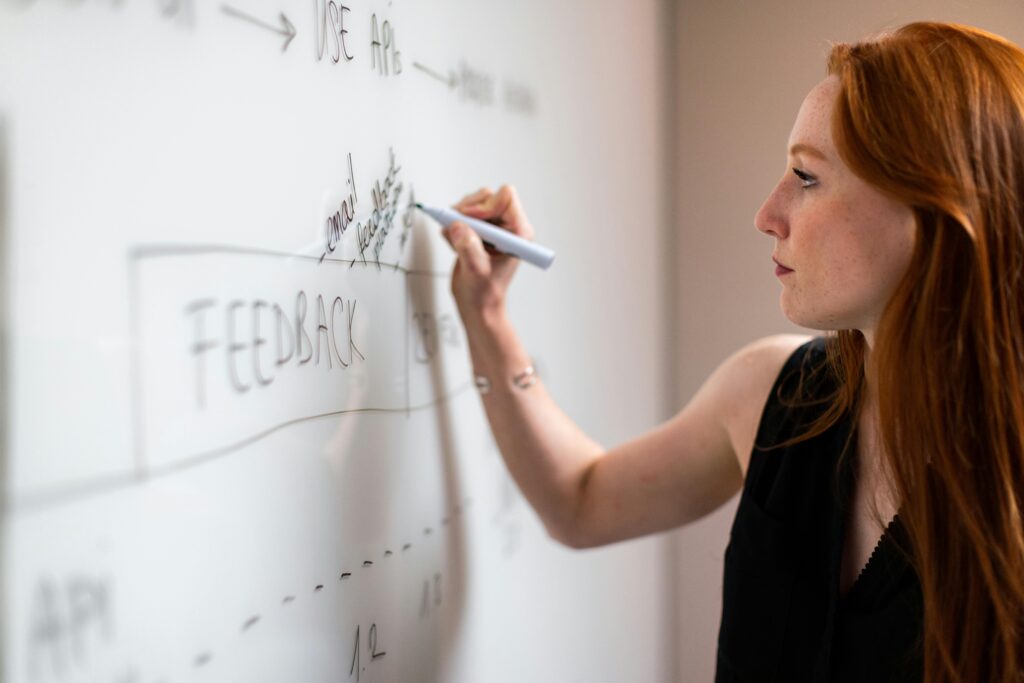Phase 8: Evaluation and Completion
After a period of intensive collaboration, there comes a time when the coaching process will be concluded. The end of the trajectory is an opportunity to look back with the coachee on the results achieved, the growth and the changes that have been realized, and to discuss possible next steps. It is time for evaluation and conclusion.
The evaluation and closing phase is not just about closing, but also about securing the results for the future. How do you ensure that the insights and skills achieved are sustainably integrated into daily life?

8.1 Reflecting on development and progress
At the beginning of the coaching trajectory, you have set goals with the coachee. In this last session, you will come back to this. It is time to evaluate: has the coachee achieved the desired effects? Why or why not?
In addition, you can ask questions about the process. What steps helped the coachee most in your progress? What surprised him or her during the process?
By setting goals in Trackler and working with progress reports, you have a visual overview of progress. This way, the coachee can see growth and change in concrete terms.
8.2 Successes and lessons learned
In addition to discussing goals, it is important to acknowledge both the successes and challenges experienced during the journey. For example, ask:
- What are you most proud of in your development over the past period?
- What are the biggest successes you have achieved and why?
- What challenges have you faced and how did you overcome them?
- What have you learned about yourself during this process?
- What touched you?
Recognizing successes and overcoming obstacles strengthens the coachee's sense of self-confidence. In this way, it emphasizes how far the coachee has come, which will give a positive, proud feeling.

8.3 Integrating insights and skills
If all goes well, the coachee will have developed insights and skills at the end of the trajectory and integrated these into his or her life. Of course, it is important that the change is sustainable and that the coachee can continue independently.
You discuss with the coachee the insights and skills he or she has gained and what steps he or she can take to maintain growth. How can the coachee stay motivated?
With Trackler you can share additional tools such as reflection forms or practical micro-learnings, which allow the coachee to continue to use the acquired knowledge independently after the process.
8.4 Feedback and evaluation of the process
The closing phase is not only a moment of reflection for the coachee, but also for you as a coach. This is the opportunity to ask for feedback on your coaching and the process as a whole. You can ask questions such as:
- How did you experience this process?
- What did you find most valuable in my guidance?
- Are there things you would have liked to see differently?
- Would you recommend me to others, and why?
This feedback helps you to further develop yourself as a coach and to refine your approach. You can also use the feedback, if the coachee gives permission for this, for marketing purposes. It can be useful to use a feedback form, so that you can use the written feedback and can always read it back.

8.5 Discussing next steps
Sometimes, during the completion of a trajectory, it becomes apparent that the coachee needs further guidance, for example for a specific goal or to strengthen the results achieved. It may also be that they know that they will need you again in the future. This is a good time to discuss possible follow-up steps:
- Does the coachee need a follow-up process?
- Would a separate follow-up session be useful?
- What support can help keep the coachee on track?
Trackler offers the possibility to easily plan follow-up steps and include them in your agenda. For example, think of an automatic reminder to schedule a follow-up session after a few months.
8.6 Closing time
The closing phase can also be an emotional moment. It marks the end of an intensive collaboration and the start of a new chapter for the coachee. Therefore, close the trajectory in a positive and dignified manner.

Conclusion
The evaluation and closing phase provides an opportunity to reflect on the results achieved, celebrate successes and help the coachee to sustainably integrate the insights and skills gained into daily life.
With Trackler, you can approach this phase in a structured and professional manner, from compiling progress reports to collecting feedback and planning any follow-up steps. By completing the process with care and attention, you ensure that the coachee can continue independently with confidence and motivation. A well-executed completion is not only a valuable conclusion, but also a stepping stone to further growth and success.
Want to read more about the other steps in the coaching process? Click here here.